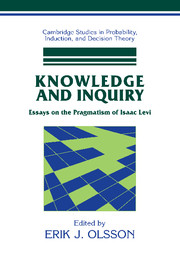Book contents
- Frontmatter
- Contents
- List of Contributors
- Preface
- Introduction: The Pragmatism of Isaac Levi
- 1 Isaac Levi and His Pragmatist Lineage
- 2 Is Pragmatist Truth Irrelevant to Inquiry?
- 3 The Knowledge Business
- 4 Infallibility and Incorrigibility
- 5 Why Inconsistency Is Not Hell: Making Room for Inconsistency in Science
- 6 Levi on Risk
- 7 Vexed Convexity
- 8 Levi's Chances
- 9 Isaac Levi's Potentially Surprising Epistemological Picture
- 10 Isaac Levi on Abduction
- 11 Potential Answers – To What Question?
- 12 Levi and the Lottery
- 13 The Value of Truth and the Value of Information: On Isaac Levi's Epistemology
- 14 Decision-Theoretic Contraction and Sequential Change
- 15 Deciding What You Know
- 16 Levi's Ideals
- 17 The Mind We do Not Change
- 18 Psychoanalysis as Technology
- 19 Levi on Money Pumps and Diachronic Dutch Books
- 20 Levi on the Reality of Dispositions
- 21 Replies
- Index
18 - Psychoanalysis as Technology
Published online by Cambridge University Press: 05 March 2010
- Frontmatter
- Contents
- List of Contributors
- Preface
- Introduction: The Pragmatism of Isaac Levi
- 1 Isaac Levi and His Pragmatist Lineage
- 2 Is Pragmatist Truth Irrelevant to Inquiry?
- 3 The Knowledge Business
- 4 Infallibility and Incorrigibility
- 5 Why Inconsistency Is Not Hell: Making Room for Inconsistency in Science
- 6 Levi on Risk
- 7 Vexed Convexity
- 8 Levi's Chances
- 9 Isaac Levi's Potentially Surprising Epistemological Picture
- 10 Isaac Levi on Abduction
- 11 Potential Answers – To What Question?
- 12 Levi and the Lottery
- 13 The Value of Truth and the Value of Information: On Isaac Levi's Epistemology
- 14 Decision-Theoretic Contraction and Sequential Change
- 15 Deciding What You Know
- 16 Levi's Ideals
- 17 The Mind We do Not Change
- 18 Psychoanalysis as Technology
- 19 Levi on Money Pumps and Diachronic Dutch Books
- 20 Levi on the Reality of Dispositions
- 21 Replies
- Index
Summary
This chapter is about the relationship among three things: the concept of agency, the concept of mentality, and the practice and theory of psychoanalysis. Its large effort is to show what consequences follow for our understanding of what goes on in psychoanalysis, once we properly understand the nature of agency and the kind of mentality that makes agency possible. For some years, I have been exploring the relations between a normative account of the nature of agency and various issues in the philosophy of mind, most particularly the special nature of self-knowledge among all the knowledges we have. Since self-knowledge as a theme is so central to psychoanalysis, it is not surprising that that exploration should yield some consequences for how we might think of the basic notions by which we approach psychoanalysis. But it was not until I came first to see the importance of viewing mentality (in its intentional aspects) in terms of commitments, under the influence of my colleague, Isaac Levi, that I could quite see the interrelations between the notion of agency and the subject of this chapter. For some years he would hammer away at my efforts in these areas, insisting that my own instincts and ideas on the nature of agency and its effect on self-knowledge implied a particular view of intentional states as commitments.
- Type
- Chapter
- Information
- Knowledge and InquiryEssays on the Pragmatism of Isaac Levi, pp. 266 - 288Publisher: Cambridge University PressPrint publication year: 2006

